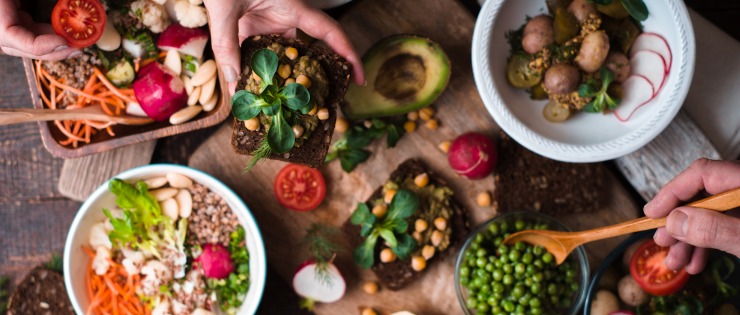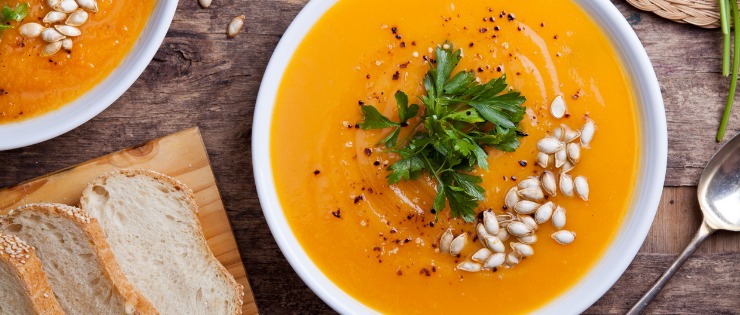
There is a worldwide movement towards eating less meat. Compassion for animals is one reason people become vegetarians or flexitarians, but many others are making the switch for their health and other reasons. So what are the reasons you should consider reducing your meat intake and upping your consumption of veggies?
Health benefits: Eating more veggies can improve nutrition, assist with weight control and reduce the risk of chronic disease.
Environmental benefits: meat production is a major contributor to global warming.
Financial benefits: meat can be expensive, cutting down can also cut down your grocery bills.
#1 Nutritional Benefits
The Australian dietary guidelines recommend we eat five serves of vegetables every day for good health. However, fewer than one in ten Australian adults actually eat the recommended amount of veggies each day. The rest of us are filling up on other foods like meat, grains and dairy products. While red meat, fish and poultry provide valuable protein and minerals which the body uses for cell repair, we are still missing out on the vitamins, minerals, and fiber only vegetables can provide.
What are the health benefits of vegetables?
Vegetables contain some of the highest quantities of vitamins and minerals compared to other food types. The nutrients found in vegetables and their associated health benefits include:
Vitamin C: helps with the repair of minor skin injuries and keeps teeth and gums healthy
Iron: essential for red blood cells to carry oxygen around the body
Magnesium: Vital for healthy bones and reducing the change of muscle cramps and high blood pressure.
Folic acid: essential for women who may fall pregnant as it reduces the risk of having a baby with a brain or spinal cord defect.
Vitamin A: for healthy eyes and skin and protection against infection.
Calcium: necessary for healthy bones and teeth and for the normal functioning of muscles, nerves and some glands.
Fibre: decreases the risk of coronary heart disease and bowel cancer.
Potassium: helps maintain ideal blood pressure.
Eating five serves of vegetables for just one week can help you feel more energised due to regulated blood sugars levels and the increase in vitamins and minerals.
#2 Less Weight Gain (Sometimes)
The average Australian adult increases in weight by 0.62 kg over the entire year. Just over half of the gain (0.32kg) is made over the festive period and it can’t all be blamed on the 'Christmas Pud'. The ham, turkey, pork and chicken we eat at Christmas lunch, and as leftovers days later is responsible for some of the unwanted curves we carry all year.
Making the switch from meat to vegetables throughout the year should help you stop gaining weight in theory. The problem is we don’t eat vegetables on their own. It’s the way we prepare the vegetables and what we eat them with that adds the kilojoules. It’s the au gratin sauce, the cream in bakes, the butter for mashing, the oil for roasting and dressings on salads that are the hidden calories. You might think you’re doing the right thing eating vegetables, but in some instances, you would be better off choosing a lean piece of pork in comparison to the creamy potato bake.
Eating more vegetables will also help reduce the chance of reaching for junk food. Keeping cut up carrot and cucumber sticks on your desk at work could stop you visiting the vending machine mid-afternoon.
If you're eating less meat to reduce your chance of gaining weight, be mindful of what you are adding to your salad or cooked vegetables. Try to eat as many vegetables as possible raw and when you do use condiments and other ingredients, check the packaging for calories and ingredients. Many dressings have hidden calories in the form of lots of added sugar.
Meat eaters are three times more likely to be obese than vegetarians and nine times more likely than vegans so it seems that, overall, eating less meat and more vegetables could help your waistline.

#3 Reduce Cholesterol
Saturated fats raise blood cholesterol levels, and the majority of these fats are found in animal meat. A study in the Journal of the American Heart Association summarised 11 studies from around the world to see if a vegetarian diet affects cholesterol levels in people with heart disease or risk factors of heart disease. Aged between 28 to 54, the participants ate a vegan or vegetarian diet compared to an omnivorous diet of plant and animal products. Researchers found that participants eating a vegetarian diet reduced their total cholesterol by 13.9 mg, LDL (bad cholesterol reduced by 13.1mg and HDL (good cholesterol) reduced by 3.9 mg. The study recommended a vegetarian diet in combination with increased exercise and reducing obesity. So, if you struggle to keep your cholesterol in check, a good place to start could be eating less meat that is high in saturated fats.
#4 Help Your Skin
Australians spend millions every year on skin creams and beauty products, all in pursuit of good looking skin. If only they knew they could just eat their way to a glowing complexion.
A diet rich in omega-3 fats, zinc and vitamin E can improve skin conditions like eczema and psoriasis, so you are better off eating fish rather than meat. If you suffer from acne, some dermatologists recommend cutting back on saturated and hydrogenated fats found in meat, processed foods and margarine. Selenium-rich foods like tuna, nuts, seeds and wholemeal bread are better for acne sufferers.
A dermatologist recommends acne sufferers eat 10 fist sized servings of vegetables, particularly those that are deep or bright colours as they provide a variety of antioxidants that dampen free-radical damage and inflammation.
So, cutting back on meat to increase your vegetable intake can help your skin if you experience acne and other skin conditions.

#5 Reduce the Risk of Chronic Disease
Many research studies have been conducted on the health effects of eating a diet high in meat. Due to the high saturated fat quantity, overeating meat has been linked to cancer.
The World Health Organisation classifies processed meat such as bacon, salami and sausages as group 1 carcinogen that increases your risk of colon and rectum cancer by 18%. Red meat such as beef, lamb and pork were classified as group 2A, probably causes cancer.
A study in Germany and England revealed that vegetarians are 40% less likely to develop cancer than meat eaters.
A Harvard study in 2014 found one serving of red meat during adolescence was linked to a 22% higher risk of premenopausal breast cancer. Eating one serving per day as an adult had a 13% higher risk of breast cancer.
Saturated fat has been linked to cancer and cognitive disorders including Alzheimer’s disease and dementia.
#6 It’s Good for the Environment
A Food and Agriculture Organisation of the United Nations report in 2006 advised that animal production contributes on a ‘massive scale’ to global warming as well as land degradation, water and energy use, deforestation and a decline in biodiversity.
Known as environmental vegetarianism, some people eat a plant-based diet to reduce their carbon footprint, save water and reduce the amount of land needed for farming animals.
Ruminant animals such as cows, sheep, goats and camels contribute to global warming due to the enormous quantities of methane they produce in their guts then belch out into the atmosphere. A dairy cow can produce 200 litres of methane per day while a sheep produces 30 litres. The total annual methane emission from livestock is estimated to be 100 million tonnes per year making it the biggest man-made methane source after growing rice.
Animal production requires a massive quantity of water. It is estimated that 8% of the world’s human water consumption is used for livestock production. A kilo of wheat requires about 1,500 litres of water to produce while one kilo of beef requires ten times more water. Much of that water is used in manufacturing animal feed. Vegetable production requires much less water.

#7 It’s Good for your Hip Pocket
Buying meat for the nightly meal is expensive. For many families meat is the is the most expensive part of their grocery bill. If you’ve visited supermarkets in some European countries, you’ll know that meat is even more expensive there.
Swapping one meat-based main meal a week to a vegetarian dish can slash hundreds off the annual food budget and thousands if you cut out all meat completely.
The Mediterranean diet has been long considered the healthiest. Most blue zone residents - areas where a high percentage of the population lives beyond 100 years of age - eat some form of the Mediterranean diet. A US research project proved you can eat a Mediterranean diet for less money than the United States Department of Agriculture’s economic dietary recommendations. Using frozen vegetables can reduce costs considerably without compromising on nutrient quality.
How to Eat More Vegetables
If you aren’t ready to give up meat but want to increase your intake of vegetables, there are plenty of ways to do so.
Vegetable Juice: start your day with a juice or green smoothie packed with vegetables. You may even reach your recommended daily intake of vegetables before the morning tea cravings have a chance to kick in.
Swap Lunch Meat for a Salad: the experts have been telling us for years that processed deli meats are bad for our health. They can contain carcinogens so if you have a ham sandwich every day for lunch, try roasted vegetables or salad fillings instead.
Meat Free Monday: if you can’t bear the thought of giving up meat for good, swap your evening meal on Mondays to a vegetarian meal. There are plenty of vegetarian recipes you can try until you find half a dozen you can rotate through.
Soups in Winter: warm up with a vegetable-based soup for lunch or dinner throughout winter. Packed with chunky or pureed vegetables, you can’t go wrong with soup.

Can you Be a Semi or Partial Vegetarian?
There are many benefits of a vegetarian diet but vegetarianism doesn’t have to be an all or nothing affair. Some people have a diet high in vegetables and avoid some types of meat but don’t eliminate meat completely.
- A pescetarian diet includes fish and other seafood but no meat
- A pollotarian diet includes chicken, fish, eggs and dairy products but no red meat including all land mammals.
- A pollo-pescetarian diet includes poultry, fish and seafood but no red meat.
- Lacto vegetarians don’t eat meat, poultry, fish, or dairy products but consume dairy products.
- Ovo vegetarians don’t eat meat, poultry, fish, or dairy products but eat eggs.
- A macrobiotic diet is plant-based but includes the occasional meal of fish or seafood.
Be Flexible and See What Works For You
As you can see, there are many reasons to eat more veggies and less meat. If you replace meat products with vegetables, you will be boosting your vitamin and mineral intake which has plenty of health benefits. Swapping meat for vegetables also provides financial and environmental benefits. But there is no need to go cold turkey and attempt to become a strict vegetarian overnight. Try slowly introducing more vegetarian meals to your diet and monitor how your body feels from its vegetable boost.